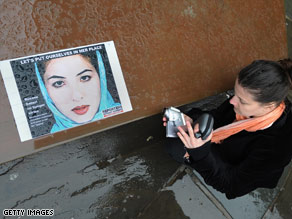TEHRAN, Iran (CNN) -- Iran has released imprisoned Iranian-American journalist Roxana Saberi, her lawyer said Monday.


Roxana Saberi records video in Tehran, Iran, in a photo taken in September 2003.
Saberi, 32, was convicted last month on espionage charges in a one-day trial that was closed to the public. She was sentenced to eight years in prison. She denies the charges.
Secretary of State Hillary Clinton confirmed the release, and said the U.S. government is "heartened" by the development.
Clinton added, however, that the United States continues to "take issue" with the charges initially brought against Saberi, who is expected to leave Tehran within the next several days.
Earlier, Saberi's father, Reza Saberi, said her release was imminent, and that he had signed paperwork.
"We are very happy with the news," he told CNN. "We were hoping for it."
Iran's state-run news agency IRNA, citing a judiciary spokesman, reported that the verdict against Roxana Saberi was "reversed in the appeal court and she is to be freed."
Her sentence has been changed to a two-year jail term suspended for five years, IRNA reported.
State-run Press TV, citing "officials close to the case," reported that the suspended sentence "will be automatically abolished if Saberi shows no unlawful conduct in the next five years."
"So, practically, she is free as of today," Reza Saberi said.
The family will return to the United States "as soon as we can make arrangements for the trip," he said.
The change came a day after Iran's court of appeals held a five-hour session on the case.
The court agreed with Saberi's lawyers that Iran is not at war with the United States -- and that therefore Saberi cannot be punished for cooperating with agents of a nation at war with Iran, according to Khorramshahi.
Saberi was detained in January after initially being accused of buying a bottle of wine and working as a journalist without proper accreditation, according to the Committee to Protect Journalists, an advocacy group.
Saberi has lived in Iran since 2003 and reported for international news organizations, including National Public Radio, the BBC and ABC News until her press credentials were revoked in 2006, the Committee to Protect Journalists said. She continued to file short news items, according to NPR.
"Without press credentials and under the name of being a reporter, she was carrying out espionage activities," Hassan Haddad, a deputy public prosecutor, told the Iranian Student's News Agency.
Authorities said Saberi confessed. Her father has said he thinks she was coerced into making damaging statements.
Iranian President Mahmoud Ahmadinejad sent a letter last month to Tehran's prosecutor calling for justice in the cases of Saberi and another detained journalist, Hossein Derakhshan, state-run news agency IRNA reported. Derakhshan is an Iranian-Canadian blogger who has been imprisoned in the country since November.
Reporters Without Borders, a group that fights for journalists' rights worldwide, says Derakhshan was sentenced to four years in prison for disseminating the views of one ayatollah and for "publicity against the government."
Saberi went on a two-week hunger strike to protest her detention, but ended it last Monday after her parents visited her in prison and pleaded with her to stop, Reza Saberi told CNN.
At one point during the hunger strike, she was hospitalized and fed intravenously, her father said. "She was very desperate to get out. ... She was quite relieved to know that the whole world is supporting her."
Saberi's case has prompted denunciations from President Obama, as well as other U.S. and international officials.
The whole experience has been "very depressing" for her, and she has gone through a great deal of frustration, Saberi's father said Monday. "It will take some time before she can overcome it."
He added, "it's not the (Iranian) people -- they are very friendly. We don't understand why it happened."
Journalist advocacy groups welcomed Saberi's release.
"We are thrilled that Roxana Saberi has been released from prison and look forward to welcoming her home," said Joel Simon, executive director of the Committee to Protect Journalists, in a written statement. "But this is also a moment to reflect on the difficult conditions that Iranian journalists endure every day. Several Iranian journalists remain jailed today. We urge they be given the same opportunity for judicial review that was afforded to Roxana Saberi."
"The appeal court's decision to free her can be used as a legal precedent for other journalists currently detained in Iran," said Reporters Without Borders in a statement. "The fact nonetheless remains that, despite her innocence, she is still regarded as guilty by the Iranian authorities. ... The sentence is still unjust, as is the ban on her working as a journalist in Iran."
No comments:
Post a Comment